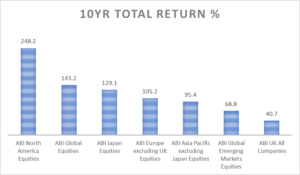Forcing pension schemes to disclose their UK holdings could perversely result in less funding for British businesses, according to industry warnings.
AJ Bell has said government proposals to compel UK DC schemes to disclose UK investments could have unintended consequences and lead to funds with high UK exposure being shunned.
This problem is likely to be exacerbated if the government also moves ahead with plans, announced at the same time, to close underperforming schemes.
Its figures (based on FE Data) show that over the past 10 years the UK market has significantly underperformed other global stock markets., with the average pension fund invested in UK shares has returned 40.7 per cent over the last 10 years, compared to 143.2 per cent from the typical pension fund invested in global shares.


AJ Bell head of investment analysis Laith Khalaf says: “The Chancellor’s pension reforms could backfire on British business. If league tables for pension fund performance were published right now, they would probably show those with high exposure to UK shares languishing near the bottom. The poorly performing schemes the Chancellor wants to close to new business could very well be the same ones he wants to champion as exemplary models of investment in UK plc.”
He points out that these performance figures show that a £10,000 investment in a pension fund investing in just UK equities would now be worth £14,071, compared to £24,319 if invested in a global pension fund.
He adds: “In reality the default funds targeted by the new pension reforms would never invest in just UK equities. But the vast gulf in regional equity performance shows the challenge faced by those schemes who might want to stick their head above the parapet and invest heavily in UK shares.
“It also highlights the fact that the government’s decision to make pension funds publish their UK exposure as well as their performance might actually result in default fund selectors shunning funds which have bet heavily on UK plc.”
He adds that benchmarking may have a knock-on effect on performance on many pensions schemes.
“Pension fund selectors are already sensitive to investment strategies which deviate too far from peers and global stock market indices. If you’re choosing a pension fund for hundreds, thousands, or possibly tens of thousands of employees, then conventional wisdom is not to take too much risk. That often means sticking pretty closely to the MSCI World Index with the equity side of your default strategy.
“Unfortunately the UK now only makes up 3.9 per cent of that global index, down from around 10 per cent just over a decade ago. If you look at the MSCI World SRI index, which weights stocks according to the ESG credentials that are so important to many pension schemes, the proportion held in the UK is even lower, at 3.5 per cent.
“These percentages are based just on the equity portfolio of the pension fund, in practice they are also diluted by fixed interest exposure, which in many pension schemes will be in the region of 20 per cent to 40 per cent.
He adds: “There is something of the chicken and the egg about the performance of the UK stock market and its position in global benchmarks. Capital flows into UK equities would spark better performance, which put upward pressure on the UK weighting in global stock market indices, which would in turn create greater capital flows. The government should have its fingers crossed for some catalyst for a rally in UK stocks that might trigger a virtuous circle. However, good relative returns from the UK in 2022 were not rewarded with an enduring flourish, which suggests any turnaround would need to be sustained for some considerable time to instil enough confidence amongst investors to significantly move the dial in global indices.”
Khalaf says part of the problem is that global benchmark rankings are not only determined by UK performance, but also the performance of other regions, notably the US, which now makes up over 70 per cent of the MSCI World Index.
He points out that two individual US stocks, Apple and Microsoft, each constitute more of the index than the entire UK stock market.
“This underlines the challenge faced by the UK stock market in a globalised investment universe where capital flows are corralled by benchmark indices.”
He welcomes though the decision to “shine a light on pension fund performance” which remains an important slice of the average UK household wealth but has not always been open to the same level of scrutiny as large retail investments funds like Fundsmith Equity or Scottish Mortgage investment trust, which are part of many people’s Sipps and Isas.
For full details of the performance of more than 20 UK multi-employer schemes and the asset allocation breakdown of their default funds, including the split between UK and overseas equity holdings, see Corporate Adviser’s CAPA-data.com website, or request the Corporate Adviser Master Trust & GPP Defaults Report 2023 (cited in the Government consultation). The 2024 edition of the report will be published in April 2024.
The post Hunt’s DC pension reforms could result in less funding for UK plc: AJ Bell appeared first on Corporate Adviser.



